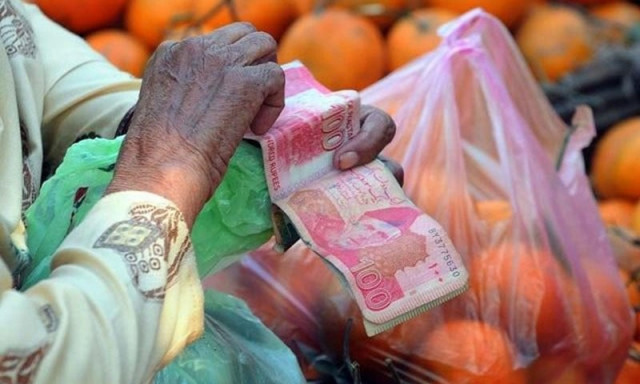Finance ministry releases ‘ambiguous’ outlook report
Document predicts halt in inflation spike in September

The finance ministry on Friday predicted a halt in the inflation spike in September amid its inability to give forecasts for the country’s macroeconomic indicators while deviating from its previous standards.
“September may show a halt to the recent drastic accelerations of the year-on-year inflation rate,” read the monthly economic outlook report. However, it did not give a forecast inflation rate range.
The report was released on Friday, a few days behind the original schedule, without giving important projections about the inflation rate, the trade deficit, economic growth rate and the current account deficit.
The inflation rate had spiked to 27.3% in August, which according to an internal assessment by the World Bank might further increase in the coming months.
The finance ministry said the inflation had started reverting as the month-on-month price increases have been on a declining path during the last two months.
There has been a steady decline in international food and oil prices during the last two months, according to the report.
The finance ministry highlighted the issue of the rupee deviation but did not discuss in detail its impact on inflation.
“On the other hand, since March the Pakistani rupee is depreciating against the USD,” a brief comment on the issue read.
Read Dar favours currency market intervention
One worrisome problem is the devastating effects of the recent floods, which have destroyed a substantial part of crops.
It said the floods' effects on inflation were being alleviated by prompt government measures to counter forms of price speculation and to provide sufficient supplies by allowing trade from neighbouring countries.
“Still, the risk of second-round effects of recent inflationary shocks persists which may work themselves through the markets,” it added.
The ministry said the economic outlook for Pakistan in the current fiscal year had become uncertain and would likely remain below the target but it did not give the range number.
“Macroeconomic imbalances may ease with the expected slowdown in economic growth," the report added, without highlighting these imbalances.
The ministry said since the start of the current fiscal year, economic activity seemed to have fallen to a lower growth path.
Contributing indicators to this observation are the growth slowdown in the rest of the world, limited year-on-year growth in manufacturing, high domestic inflation, eroding real incomes, and rising production costs, it added.
Probably the data does not yet incorporate the economic costs of the recent floods, the ministry stated.
The report read that Pakistan's external environment faced rising challenges and the recent floods brought on by extremely strong monsoon rains had negatively impacted crops, altering the economic outlook mostly through agriculture performance.
The farm outlook is still not clear as the output of both important and other Kharif crops has suffered significantly because of the recent floods and unprecedented heavy monsoon rains. The accumulation of water in the cropping area may also affect the sowing of Rabi crops.
Already confronting inflationary and external sector pressures, the economy of Pakistan is under severe economic and humanitarian crisis due to the ecent flash floods.
According to the UN's Food and Agriculture Organisation's (FAO) geospatial assessment, an area of over 9.461 million acres of cultivated crops has been affected, more than half of it in Sindh, increasing the risk of food insecurity.
Read more Explainer: How worried should we be about the economy?
While commenting on the budget, the finance ministry said the fiscal deficit was budgeted to reduce to 4.9% of the GDP, while the primary balance was a surplus of Rs153 billion.
The budget for FY2023 was prepared to achieve the goals of stabilising economic growth, increasing revenues, rationalising expenditures through prudent expenditure management, enhancing exports, and protecting the vulnerable segments of society through relief measures and pro-poor initiatives.
The finance ministry said in the coming months, the baseline scenario was moderation in imports, following a domestic growth slowdown but it did not give a forecast.
“At the same time, exports would stabilise, helped by a relatively stable REER [real effective exchange rate] at historically low levels,” according to the ministry.



















COMMENTS
Comments are moderated and generally will be posted if they are on-topic and not abusive.
For more information, please see our Comments FAQ